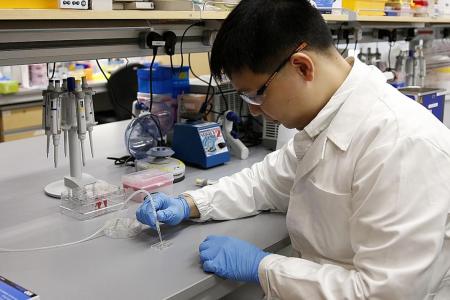Local researchers create kit to test for cervical cancer virus
Local researchers have created a device, about the size of a credit card, which can accurately and quickly screen for the human papillomavirus (HPV) that causes cervical cancer.
The whole process would take between 30 minutes and an hour, and each test kit costs under $1. Conventional laboratory tests have a turnaround time of several days to a month and cost around $100.
Tests are now being done to determine its accuracy in detecting infectious diseases, including Zika, dengue and hand, foot and mouth disease, as well as other diseases like breast and colorectal cancer.
Researchers from the National University of Singapore (NUS) and the Agency for Science, Technology and Research's Institute of Molecular and Cell Biology said the device has performed as accurately as laboratory tests with screenings for HPV, but with an added advantage.
"While laboratory tests can detect one to two HPV strains, the kit is able to detect over 10 strains and has better coverage for each strain," said Assistant Professor Shao Huilin from the NUS Biomedical Institute for Global Health Research and Technology.
Cervical cancer, which can be prevented, is the 10th-most common female cancer here.
Researchers, who spent 11/2 years developing the screening kit, are hoping to commercialise it in a year.
Called enVision, or enzyme-assisted nanocomplexes for visual identification of nucleic acids, the kit uses molecular agents that can detect disease-specific molecules.
The kit can detect viruses, bacteria and DNA changes that are known to lead to the development of various diseases.
Users put a drop of their tissue sample or bodily fluid into a small disc, which then flows to another disc containing a molecular agent that changes colour from white to brown if a disease is detected, said Prof Shao, the principal investigator of the study.
If the infection is more severe, the disc will turn to a darker brown.
An initial study of 35 National University Hospital patients to check for HPV showed encouraging results.
The study, which was conducted from November last year to March, found that enVision has a 95 per cent accuracy rate, comparable with conventional laboratory tests.
Get The New Paper on your phone with the free TNP app. Download from the Apple App Store or Google Play Store now



